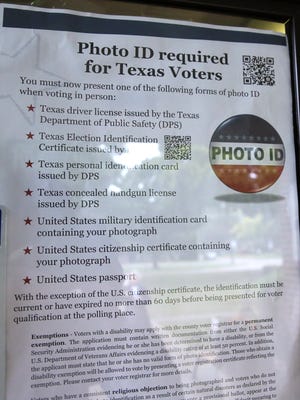Texas judge OKs compromise on voter ID law

CORPUS CHRISTI, Texas — Voters in Texas without a photo ID will be able to cast their ballots come November, a federal judge ruled Wednesday.
U.S. District Judge Nelva Gonzales Ramos in Corpus Christi signed an agreement between Texas state officials, the federal government and civil rights plaintiffs that clears the way for voters without photo IDs to cast their ballots as long as they sign a declaration stating they have a "reasonable impediment" to obtaining one of the types of photo identification required in Texas' voter ID law.
The order softens Texas' controversial voter ID law that a federal appeals court last month found racially discriminatory. The law required voters to show one of six types of a government-issued photo IDs, such as a driver's license or passport, and could have left up to 600,000 Texas voters without the proper identification in this fall's presidential elections, opponents claimed.
Under the approved agreement, voters may show an alternative form of identification, such as a utility bill or government check that displays the voter's name and address. The agreement also allows voters to use photo IDs such as a driver's license or personal ID card from any state, expired or not.
Courts may play pivotal role on voting rights in 2016 election
However, voters who have one of the six types of government-issued photo IDs, or are able to get one, are still required to use those.
The state will also spend $2.5 million on efforts to inform voters of the changes in time for early voting and Election Day.
"There is a great sense of relief here in South Texas and the Corpus Christi community that thousands of voters need not worry about their ability to vote on Election Day," said Daniel G. Covich of Covich Law Firm. The Corpus Christi-based law firm was involved in the case that grabbed national attention.
The controversial voter ID law was enacted in 2011, blocked by a federal district judge in 2012 and then put into effect in 2013, when the Supreme Court struck down a key part of the Voting Rights Act that had required Texas and some other states to get federal approval for voting changes. Challengers have won every court case since, but the law had remained in effect.
Seventeen states have new voting procedures in place for the November election, many of which are being challenged in court. Many require voters to show photo identification, such as the Texas law. Others target rules for registering, early voting and provisional voting, such as the wide-ranging North Carolina law that caused confusion and long lines in March's primary.
Those wide-ranging restrictions came under attack as racially discriminatory before a three-judge panel of the U.S. Court of Appeals for the 4th Circuit in June
Follow Krista M. Torralva on Twitter: @CallerKMT